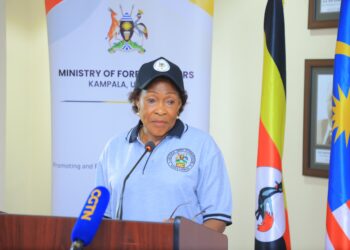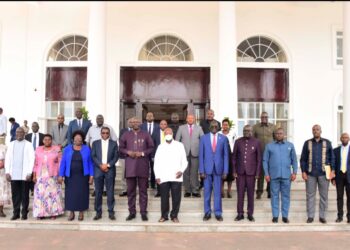Uganda under Conservation Through Public Health (CTPH) will partner with conservation civil societies and government agencies to host second-ever Africa’s Primatological Conference (APSConference19).
The conference will take place from 3rd to 5th September 2019 at Imperial Botanical Beach Hotel in Entebbe under the theme “Primate Conservation in Africa: Challenges and Opportunities”.
While addressing journalists at the Media Centre on Wednesday, Minister for Tourism, Wildlife and Antiquities Prof. Ephraim Kamuntu said that Uganda was best placed to host the APSConference19 since she is well known as the “Primate Capital of the World”.
“The conference will bring together scientists, researchers and primate experts to discuss pressing issues relating to primate conservation and protection, said Kamuntu. Adding “Uganda boasts of a rich and diverse wildlife heritage owing then to its unique location at the zone that overlaps between the savannah of East Africa and the rainforests of West Africa this has given us an upper hand in having the largest number of primates”.
According to reports from CTPH, it’s estimated that 60% of all primate species are threatened with extinction as a result of human activity. The main threats to primates are habitat destruction, poaching, bushmeat trade, illegal pet trade and disease.
All Great Apes are endangered or critically endangered and are also particularly at risk from human-related diseases due to their close genetic relatedness to people.
Prof Kamuntu urged that for the good of tourism such conferences are needed so that people may know the importance of conserving primates since Uganda has many primates. For example, 54 per cent of Mountain Gorillas in the world live in Uganda which has generated foreign exchange to the economy.
“A concerted effort is needed to address these threats, through increasing the level of involvement and commitment from stakeholders. Despite Africa being home to a third of the World’s primate species, native African conservation and activism remain limited and African participation in international primate forums remains disproportionately low, primarily due to the prohibitive costs of participation. Nevertheless, greater African involvement in primate research, conservation and protection are vital for the protection of primates across the continent,” said Kamuntu.
Dr Gladys Kalema Zikusoka, Chief Executive Officer and founder of CTPH said that diseases is also another factor affecting primate conservation in Africa since most people associate with most of the primates yet they are some similar diseases that affect man, Gorillas or Chimps, for example Ebola, and measles. However, she said, more research is needed to find out whether they are the same diseases that attack man.
“The recent assessment of the current status of African primates recognised many more critical species as threatened and/or endangered and emphasised the need for stakeholders to increase their level of involvement and commitment, especially native Africans should be at the forefront of conserving the continent’s biodiversity. Therefore, it is my hope and expectation that this coming conference will support our home-grown primate experts to lead the way in protecting our continent’s primates,” she said.
Dr Inza Kone the President of African Primatological Society added the most primates live in Africa however they live under threats by both humans and climate changes, he, however, said that through the coming conference a lot will be discussed to have solutions on how to conserve primates especially the critically endangered such as Red colobus and Golden monkeys.
Do you have a story in your community or an opinion to share with us: Email us at editorial@watchdoguganda.com










